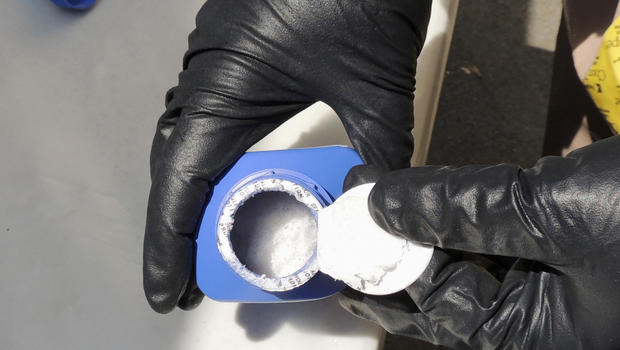A Grim Weapon
"It's a weapon. Companies shouldn't be just sending it to anybody."
"Countries that we are concerned about were interested in using it [carfentanil] for offensive purposes."
"We are also concerned that groups like ISIS could order it commercially."
Andrew Weber, U.S. assistant secretary of defence for nuclear, chemical and biological defence programs from 2009 to 2014
"We have to get fentanyl and its variants -- especially carfentanil -- and its traffickers of the streets immediately."
"They are, quite literally, killing people every day."
Rep. Daniel Donovan, Jr., Republican, New York
"EMS is a little slow[er] than FedEx or DHL but very safe, more than 99 percent pass rate."
Yuntu Chemical Co. representative

A member of the Royal Canadian
Mounted Police opens a printer ink bottle containing the opioid
carfentanil imported from China, in Vancouver, June 27, 2016. AP
The far more powerful fentanyl and its even more powerful variant, carfentanil are not on China's control list. "I know China is looking at it very closely [placing these synthetic chemicals on their listing]", stated Russell Baer, a DEA special agent in Washington. But it has not yet done so, despite pressure from the United States that it take this action. And the reason that China should take that action is that virtually all the laboratories producing these deadly chemicals operate in China, which then exports them abroad, causing havoc when these powerful and cheap drugs begin to lace opioids.
Conventional drugs like heroin are diluted with fentanyl to make for greater profit margins. And habitual drug users have no idea that the drugs they're ingesting have been watered down with more powerful agents that pose a risk to life. A tiny amount of carfentanil, for example, the size of a grain of sand, is potentially deadly. Cutting fentanyls into illicit drugs has the powerful incentive to drug dealers of vastly increasing their profits.
In 2014, authorities in the United States made seizures of 3.7 kilograms of fentanyl. Two years later, in 2016, up to mid-July, 134.1 kilograms were seized by Customs and Border Protection. And overdose rates have been soaring ever since. In British Columbia, according to the chief coroner, 488 drug overdose deaths between January and August have been attributed to fentanyl whereas the overdose death rate for all of the previous year was 505.
Before their discovery by drug dealers as a source of increased revenue, carfentanil and similar substances were being researched in the guise of chemical weapons by the United States, the United Kingdom, Russia, Israel, China, the Czech Republic and India. These are considered to be chemicals of mass destruction, banned under the Chemical Weapons Convention from the battlefield. But as far as restraints go, there is nothing to keep them from the hands of terrorists. Their availability is easily accomplished.
 |
| FILE – In this Saturday, Oct. 26, 2002 file photo, a special forces officer carries a woman out of the Dubrovka Theater where hundreds of hostages were held in Moscow, Russia. Russian special forces turned to carfentanil to end a standoff with Chechen separatists using an aerosol version of the opioid, along with the less potent remifentanil, sending it through air vents, according to a paper by British scientists who tested clothing and urine samples from three survivors. The strategy worked, but more than 120 hostages died from the effects of the chemicals. (AP Photo/Gazeta Gazeta, File) |
"We can supply carfentanil ... for sure. And it's one of our hot sales product", enthused a saleswoman from Jilin Tely Import and Export Co. in China, in an email exchange. According to Dr. Karen Grimsrud, the chief medical officer of health in Alberta, a dose the size of a grain of sand can be lethal. RCMP Supt. Yvon de Champlain revealed that Canadian authorities had seized one kg of carfentanil that had arrived in Canada from China in August. "That had the potential to produce 50 million doses." The potential damage from that 1 kg "is difficult to comprehend", he stated.
Irrespective of the dangers involved in this drug's use, vendors from China openly offer to sell carfentanil online for worldwide export. No fewer than a dozen Chinese businesses claiming they would export carfentanil to the United States, Canada, the United Kingdom, France, Germany, Belgium and Austeralia for a mere $2,750 a kilogram guarantee that any interested party would have no problem obtaining the deadly substance.
The world has yet another concern to add to the ever-growing list of threats glowering on the horizon.
Labels: Canada, China, Drugs, United States

<< Home